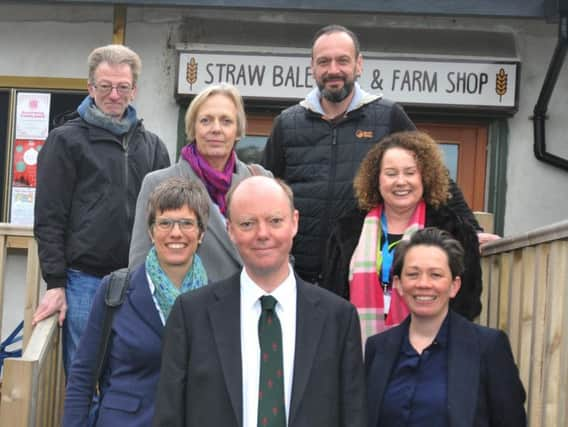Science expert visits Wigan alcohol reduction scheme


Prof Chris Whitty, chief scientific adviser for the Department of Health and Social Care and head of the National Institute for Health Research (NIHR), spent the day with professionals at Greenslate Farm in Orrell.
Other news: Drunk teen hurled abuse at Wigan police investigating scene where body was foundHe heard all about the Communities in Charge of Alcohol programme, which is funded by the NIHR as part of its work to improve the health and wealth of the nation through research.
Advertisement
Hide AdAdvertisement
Hide AdVolunteers are being trained as alcohol health champions and working to address problems caused by alcohol.
This is done by speaking to individuals about their alcohol use and looking at licensing issues.
The project aims to reduce hospital-related admissions and crime related to alcohol.
The number of people who died from alcohol-specific conditions in Wigan rose by almost 20 per cent from 2006 to 2016 and there are 4,484 alcohol-dependent adults in the borough - nearly two per cent of the population.
Advertisement
Hide AdAdvertisement
Hide AdProf Whitty was told about the work in the Greater Manchester-wide scheme.
He said: “What we have clearly got is a very committed group of people across the whole system - health, public health, council, volunteers like people working at this farm.
“There are many areas where if you look at the statistics, things like alcohol admissions to hospital dropped really quite far as a result of what people have been doing here. There is a real attempt to try to see who are the people having the real problems and try to support them.”
He welcomed research being carried out in the borough and believes it could make a real difference.
Advertisement
Hide AdAdvertisement
Hide AdProf Whitty said: “If we carry on doing research, in the future the NHS and public health will continue to improve. What we should be doing is research in places where people have the big burdens of ill health, where they need the assistance of research.
“Wigan has really good people helping and quite a lot of people with health problems and we should be doing research here. We want to help them and hope other people in future won’t get the health problems that exist today.”
The research, led by the University of Salford, launched 18 months ago in Greater Manchester and began in Wigan last year.
So far 18 people in the borough have trained as alcohol health champions, starting with volunteers in Hag Fold.
Advertisement
Hide AdAdvertisement
Hide AdA further five people have recently been trained, with new champions being recruited.
They attended a two-day training course covering the health impact of alcohol and how to start a conversation with someone about it.
It also looks at licensing issues and empowers the alcohol health champions to speak up if an off-licence is selling alcohol to children, for example, or problems when bars close.
There is a support network to help them and they can work with the council’s licensing officers.
Advertisement
Hide AdAdvertisement
Hide AdProf Kate Ardern, director of public health at Wigan Council, said the work built on that done with licensing champions by Alcohol Focus Scotland, where health is considered as a licensing objective.
It also fits in with the work already being done by the 15,000 people who are community health champions in Wigan.
Prof Ardern said: “It’s very much part of our citizen-led approach to public health in the borough. It’s very much in keeping with The Deal and based on the premise of The Deal.”
She said the project already had many benefits, including someone going to university as a result of it.
Advertisement
Hide AdAdvertisement
Hide AdChief investigator Prof Penny Cook, from the University of Salford, said: “We are relatively early in the programme but some really nice stories are coming out of it.
“There are people who have had life-changing conversations that have led to someone they have talked to getting serious health problems sorted out that have been brought on by drinking.”
Also involved in the work are researchers from Bristol and York universities.
It is a five-year project, with the results expected in 2022.
Anyone interested in getting involved in the research as an alcohol health champion should contact Addaction.